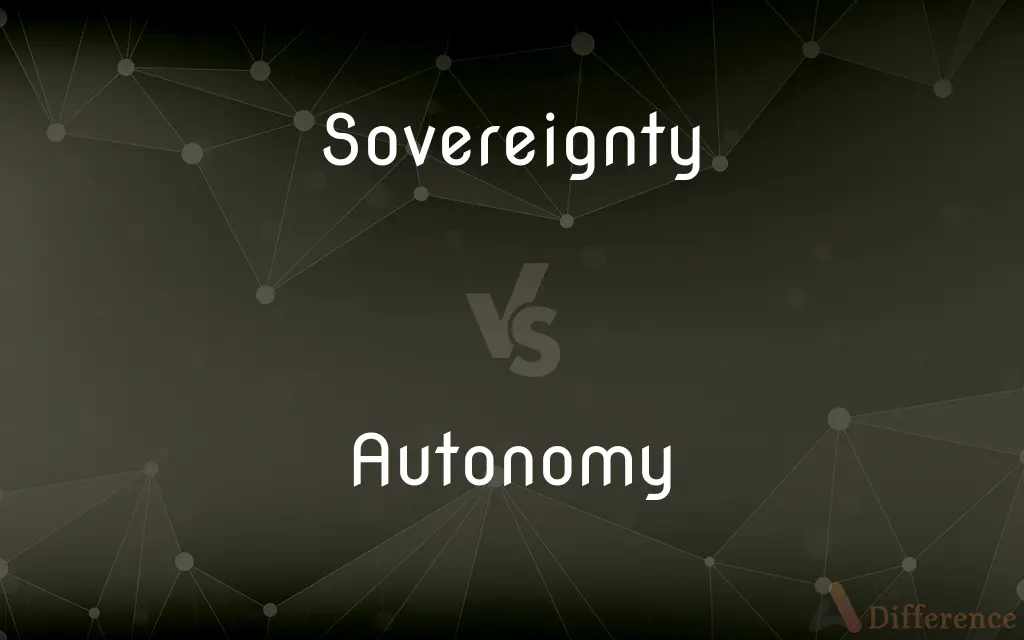Sovereignty vs. Autonomy — What's the Difference?
By Urooj Arif & Maham Liaqat — Updated on March 29, 2024
Sovereignty is the supreme power of a state to govern itself without external interference, while autonomy refers to the freedom of an individual or entity to self-govern.

Difference Between Sovereignty and Autonomy
Table of Contents
ADVERTISEMENT
Key Differences
Sovereignty embodies the concept of a state's absolute authority over its territory and population, making decisions and enforcing laws independently. This includes entering into treaties, engaging in diplomacy, and asserting its power internationally. Autonomy, on the other hand, pertains to the self-governing capacity of an individual, group, or region within a larger political entity, allowing for certain decisions to be made independently, often within the confines of a sovereign state's broader legal framework.
While sovereignty is a principle attributed to states in the international system, emphasizing their equal rights and independence from external control, autonomy is often granted to regions, minority groups, or institutions within a state, highlighting a degree of self-management or governance that does not equate to complete independence. This distinction underlines the different levels at which each concept operates: one at the level of the state in an international context, and the other at a sub-state or individual level.
Sovereignty is fundamental to the identity of a state, serving as a marker of its legitimacy and authority on the global stage. It is a key concept in international law, underscoring the rights of states to govern themselves without external interference. Autonomy, while significant for self-determination and local governance, does not confer international legal personality or the comprehensive rights associated with statehood.
The exercise of sovereignty is inherently linked to the concept of territorial integrity and political independence, where a state has the exclusive right to exercise its powers within its borders. Autonomy, however, can vary greatly in its scope and application, from broad legislative powers to more limited administrative or cultural rights, depending on the specific arrangements made within a sovereign state.
In the context of international relations and law, sovereignty is a non-negotiable status that states strive to maintain and protect, often seen as a prerequisite for participating in international diplomacy and agreements. Autonomy, while it can be a subject of international concern, especially in cases of self-determination movements, is primarily a domestic affair, shaped by the legal and constitutional frameworks of the sovereign state within which it exists.
ADVERTISEMENT
Comparison Chart
Definition
Supreme authority of a state over its territory and population.
The right of self-governance within a larger political entity.
Scope
International, pertaining to state sovereignty in global affairs.
Sub-national or individual, within the confines of a larger entity.
Legal Authority
Absolute, with the power to make laws, treaties, and engage in diplomacy.
Limited to specific areas as granted by a sovereign state.
Operational Level
State level, affecting national and international actions.
Local or individual level, within predetermined boundaries.
Key Concern
Maintaining independence and territorial integrity from external forces.
Ensuring a degree of self-determination or governance autonomy.
Compare with Definitions
Sovereignty
A core component, emphasizing a state's exclusive control over its territory.
The country defended its sovereignty and territorial integrity against external aggression.
Autonomy
Can vary widely, from significant legislative powers to more limited self-management.
The city's autonomy allowed it to pass unique environmental regulations.
Sovereignty
Involves the right to exercise power politically, legally, and diplomatically within and outside its borders.
A sovereign nation negotiates treaties with other states to establish trade relations.
Autonomy
Typically operates within a state, affecting local governance and administrative rights.
The autonomous region has its own parliament and controls over certain policy areas.
Sovereignty
The supreme power or authority of a state to govern itself or another state.
The United Nations recognizes the sovereignty of nations to control their internal affairs.
Autonomy
The capacity of an entity to govern itself within the confines of a larger system.
The regional government was granted autonomy to manage its educational system.
Sovereignty
Recognized as a key principle, ensuring states' rights to independence and non-interference.
International law upholds the sovereignty of states, allowing them to enact their own legislation.
Autonomy
Pertains to the rights of groups or regions to self-administer within broader national laws.
Indigenous communities often seek greater autonomy in managing their ancestral lands.
Sovereignty
Integral to a state's identity on the global stage, marking its status as an independent entity.
The proclamation of independence was a crucial step in establishing the nation's sovereignty.
Autonomy
May also refer to the individual or collective rights to self-determination.
The movement advocated for personal autonomy in lifestyle choices.
Sovereignty
Sovereignty is the supreme authority within a territory. Sovereignty entails hierarchy within the state, as well as external autonomy for states.
Autonomy
In developmental psychology and moral, political, and bioethical philosophy, autonomy is the capacity to make an informed, uncoerced decision. Autonomous organizations or institutions are independent or self-governing.
Sovereignty
Supreme power or authority
The sovereignty of Parliament
Autonomy
The condition or quality of being autonomous; independence.
Sovereignty
Supremacy of authority or rule as exercised by a sovereign or sovereign state.
Autonomy
Self-government or the right of self-government; self-determination.
Sovereignty
Royal rank, authority, or power.
Autonomy
Self-government with respect to local or internal affairs
Granted autonomy to a national minority.
Sovereignty
Complete independence and self-government.
Autonomy
A self-governing state, community, or group.
Sovereignty
A territory existing as an independent state.
Autonomy
(uncountable) The right or condition of self-government; freedom to act or function independently.
Sovereignty
Of a polity: the state of making laws and controlling resources without the coercion of other nations.
Autonomy
A self-governing country or region.
Sovereignty
Of a ruler: supreme authority over all things.
Autonomy
The capacity to make an informed, uncoerced decision.
Sovereignty
Of a person: the liberty to decide one's thoughts and actions.
Autonomy
The capacity of a system to make a decision about its actions without the involvement of another system or operator.
Sovereignty
Excellence, mastery, preeminent efficacy.
Autonomy
The status of a church whose highest-ranking bishop is appointed by the patriarch of the mother church, but which is self-governing in all other respects. Compare autocephaly.
Sovereignty
An independent or sovereign territory.
Autonomy
The power or right of self-government; self-government, or political independence, of a city or a state.
Sovereignty
The quality or state of being sovereign, or of being a sovereign; the exercise of, or right to exercise, supreme power; dominion; sway; supremacy; independence; also, that which is sovereign; a sovereign state; as, Italy was formerly divided into many sovereignties.
Woman desiren to have sovereigntyAs well over their husband as over their love.
Autonomy
The sovereignty of reason in the sphere of morals; or man's power, as possessed of reason, to give law to himself. In this, according to Kant, consist the true nature and only possible proof of liberty.
Sovereignty
Government free from external control
Autonomy
Immunity from arbitrary exercise of authority: political independence
Sovereignty
Royal authority; the dominion of a monarch
Autonomy
Personal independence
Common Curiosities
Is sovereignty only applicable to countries?
Yes, sovereignty is a status attributed to states, indicating their independence and control over their territory and affairs.
What are examples of autonomous entities?
Autonomous entities can include self-governing regions, indigenous territories, and special administrative zones.
How does autonomy differ from sovereignty?
Autonomy refers to the self-governance of an individual, group, or region within a larger entity, unlike sovereignty which denotes absolute state authority.
What is sovereignty?
Sovereignty is the absolute authority of a state to govern itself without external interference.
Can a region be autonomous and part of a sovereign state?
Yes, regions can have autonomy, granting them self-governance rights, while remaining within a sovereign state.
How do international laws affect sovereignty?
International laws respect the sovereignty of states, emphasizing non-interference in their internal affairs.
What is the role of sovereignty in international relations?
Sovereignty establishes a state's authority and equality in international relations, allowing for diplomacy and treaty-making.
Can autonomy lead to independence?
While autonomy grants certain self-governance rights, it does not equate to full independence or sovereignty.
Can a sovereign state relinquish its sovereignty?
A state can choose to transfer some sovereign powers through treaties or agreements, but full sovereignty is maintained unless it ceases to exist as an independent entity.
Are there limitations to autonomy?
Yes, the extent of autonomy is defined by the sovereign state and can be limited to specific areas or rights.
Share Your Discovery

Previous Comparison
Dap vs. Nap
Next Comparison
Quadratic vs. QuarticAuthor Spotlight
Written by
Urooj ArifUrooj is a skilled content writer at Ask Difference, known for her exceptional ability to simplify complex topics into engaging and informative content. With a passion for research and a flair for clear, concise writing, she consistently delivers articles that resonate with our diverse audience.
Co-written by
Maham Liaqat















































